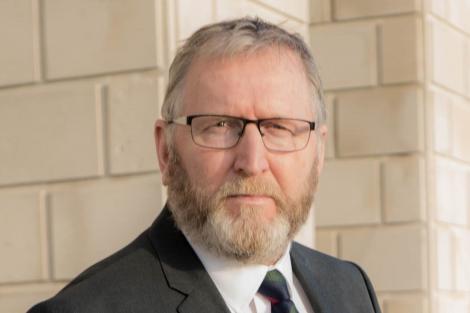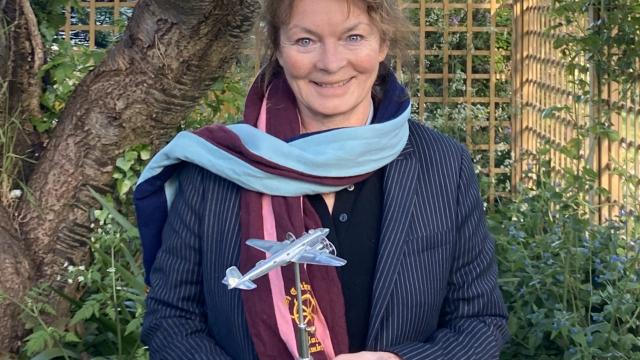
The future of the UUP and Northern Ireland
Doug Beattie MLA, leader of the Ulster Unionist Party and British Army veteran, discusses the future of Northern Ireland. Why should we feel optimistic about the future of the region? How can the UUP gain the upper hand over the DUP? Is the Northern Ireland Protocol undemocratic? And do Northern Irish parties owe public apologies for the political violence of the Troubles?
Scroll on to discover:
- Executive summary
- About the speaker and discussants
- Watch the conversation
- What was said
Executive summary
Doug Beattie MLA chats with the IOI panel and Prof. Richard Bourke, Chair of the History of Political Thought at Cambridge, about the Northern Ireland Protocol, competing visions of Unionist identity, competition between the DUP and UUP, and how Northern Ireland should approach its history and future.
- The Northern Ireland Protocol suffers from a “democratic deficit”, with Northern Irish politicians (and, by extension, voters) excluded from Westminster and Whitehall decision-making. They have no influence on the EU Common Market regulations over goods and services in the region.
- “Pragmatic, sensible voices” can find “solutions” to many of the issues around the Protocol, such as a separate “green lane” for British goods intended for sale in Northern Ireland with no onward transit to the EU. Goods destined for Northern Ireland are at no risk of leaking into European markets.
- The UUP’s progressive Unionism seeks a “union of people” across differences of religion, race, sexuality and class, and advocates reproductive and LGBT+ rights. This is a very different unionism to the “very inward looking”, “Ulster nationalist” unionism of the DUP. He argues that there are many “socially liberal” unionists and loyalists in Northern Ireland who are tired of the DUP’s “dogma of negativity”. Two thirds of non-voters are Unionists, who are waiting for a “reason to get out of bed and get to a polling station”.
- The people of Northern Ireland should take a positive, optimistic approach to the region's future; its problems with poverty, division and violence are significant, but have been put in perspective by his time in Africa, the Balkans and Afghanistan, and are ultimately “fixable”. Beattie believes that improving Northern Ireland’s economy will unlock a wide range of social benefits - improving housing, social services such as healthcare and education, discouraging emigration, and giving young people a “sense of purpose” in the morning and a “sense of fulfilment” when they go to bed.
- Asked about the effectiveness of historic public apologies, Beattie believes these could be “used more”. He calls for all political parties in Northern Ireland to publish “impact statements” on “how we got to where we are”. This could include Unionist parties acknowledging their historic support for anti-Catholic/Nationalist discrimination, and those parties, both loyalist and republican, who “supported terrorism and the murder of our citizens”, denouncing and apologising for these histories of political violence.
About the speaker
Doug Beattie is the Leader of the Ulster Unionist Party (UUP), elected to the Assembly in 2016 for the Upper Bann Constituency after serving two years as a Councillor on Armagh City, Banbridge and Craigavon Borough Council for the Portadown electoral area. Prior to entering politics, Doug served with the Royal Irish Rangers, and subsequently the Royal Irish Regiment for 27 years before joining the Army reserves where he has served for 12 years, rising to the rank of Major. He saw service in Northern Ireland, Bosnia, Kosovo, Iraq and Afghanistan, receiving the Queen's Commendation for Bravery and the Military Cross. As an Ulster Unionist Councillor, Doug was the Armed Forces Champion for Armagh, Banbridge and Craigavon Borough Council and when he became an MLA he took up the Justice portfolio which he still holds today. A one-time keen rugby player he remains an active supporter of both Ulster and Irish Rugby.
About the discussants
Doug is in conversation with Prof Richard Bourke, Professor of the History of Political Thought and Fellow of King's College, Cambridge and Dr Niamh Gallagher, University Associate Professor in Modern British and Irish History and Fellow of St Catharine's College.
Watch the conversation
What was said?
Doug Beattie thinks we should “focus on the positives in Northern Ireland”. Before Beattie entered politics in 2014, rapidly rising from a local councillor to leader of the Ulster Unionist Party in 2021, he was a soldier. Over a three-decade military career, retiring as a decorated Captain in the Royal Irish Regiment, Beattie served tours in countries such as Bosnia, Kosovo, Iraq and Afghanistan, as well as his native Northern Ireland. These experiences have put Northern Ireland’s problems into perspective for Beattie: Northern Ireland has division, but “Take yourself to Bosnia and you’ll see what division is all about”; Northern Ireland has suffered from violence (Beattie’s uncle was killed by the IRA), but this pales in comparison to the violence he has witnessed in Afghanistan; and Northern Ireland has poverty, but it is incomparable to the poverty you can find in much of Africa. Northern Ireland is an “extraordinary place to live”, its people are “passionate”, “uncompromising” and “know their own mind”, and it benefits from both membership of the United Kingdom and its close relationship with the Republic.
Nevertheless, Northern Ireland faces serious political challenges. Beattie sees improving the region’s economic performance as the key to a plethora of social benefits; greater economic growth would in turn improve education, healthcare, housing and provide “good jobs for our young people”, discouraging emigration and meaning that young Northern Irish workers would “wake up in the morning with a sense of purpose, and go to bed at night with a sense of fulfilment”. Beattie also wants greater efforts to combat community segregation, and thus reduce political division. He thinks integration should begin from the earliest age possible, in the school playground.
Beattie acknowledges that such measures would not negate “difficult questions” about national identity, Northern Ireland’s constitution, and Brexit. The Ulster Unionist Party opposed Brexit during the referendum campaign. Beattie always thought it would be “destabilising” for the post-Good Friday political balance in Northern Ireland, and he argues the dilemmas and controversies over the Northern Ireland Protocol (NIP) have proven him right. He supports nationalists in opposing a hard border on the island of Ireland, but thinks unionist objections to a sea border on the Irish Sea haven’t been accorded the same legitimacy.
Richard Bourke asks how the “integrity” of the EU Single Market could be protected without either. Beattie argues that there are lots of sensible ways to reduce the inefficiencies of the NIP. He suggests, for instance, that there could be a “virtual red lane and green lane” for British goods shipped to Northern Ireland - British exports intended for sale in Northern Ireland, with no onward transit to the EU would go in the green lane, and not be subject to laborious customs checks. Beattie notes how the supermarket chain ASDA, which does not operate in the EU, and knows its whole supply and production chain in great detail, down to which Northern Irish shop shelf British-grown produce will be placed on, is an example of goods at no risk of leaking into European markets.
Beattie believes another issue with the NIP is its twofold “democratic deficit” - Northern Irish politicians, and by extension the voters they represent, have been excluded from Westminster and Whitehall’s negotiations over the NIP, and also have no democratic influence over the EU legislation that continues to set goods standards in Northern Ireland. This poses both practical political problems - the Good Friday Agreement would “never have happened” without Northern Irish politicians at the table - and a moral, democratic issue. This is “taxation without representation”, Beattie argues. The United States “went to war over that”.
Beattie expresses his respect for the achievements of the Good Friday Agreement (GFA) - it was needed at the time to “stop us killing each other”, and provides that “fine balance that we all need” - but also argues that it “no longer produces good government”, and “needs an MOT”. Asked by Niamh Gallagher how he’d amend the GFA, Beattie suggests it should renewed not just once, but continually at ten year intervals, in a process involving all parties. He says power sharing is “really, really important”, but is not currently working; when five parties enter an Executive, with no pre-agreed programme, they generally fail to cooperate on legislation: “When the chips are down, they all sit in their silos.” He would prefer a system in which two to three-party governments face a power-sharing opposition in the Assembly.
For Beattie, moving forward constructively to secure the best future for Northern Ireland also involves reckoning with its past. Prompted by a question from an audience member on the usefulness of official state apologies, Beattie says they need to be “used more”, and proposes all Northern Irish parties give “impact statements” on “how we got to where we are”. Unionists should concede to historical discrimination towards catholics and nationalists, and anyone who “supported terrorism and the murder of our citizens”, whether loyalist or republican, should admit that this was wrong.
Beattie describes himself as an “extremely confident, positive unionist”. He is “proudly an Irishman” and always has been. Living at various points in England, Scotland and Wales, he felt “uniquely Irish, but also at home”, and “That’s what makes my unionism incredibly strong”. He regards Irish unification as a “fair aspiration”, and believes unionists across the United Kingdom have a responsibility to advocate for the benefits of the Union. However, within Northern Ireland, much of the UUP’s political campaigning is directed at competing for the votes of already convinced Unionists. Since 2003, the UUP has been displaced by the Democratic Unionist Party as the dominant Unionist party in Stormont, and Beattie is determined to reverse this decline.
Beattie differentiates the UUP’s progressive Unionism, which seeks a “union of people” across differences of religion, race, sexuality and class, and advocates for reproductive and LGBT+ rights, from the “very inward looking”, “Ulster nationalist” unionism of the DUP. He argues that there are many “socially liberal” unionists and loyalists in Northern Ireland who have tired of the DUP’s “dogma of negativity”, and claims that two thirds of non-voters are unionists, who are waiting for a “reason to get out of bed and get to a polling station”. Beattie accepts that the UUP will need to reform its own organisation to match its progressive agenda; pressed by Niamh Gallagher on the party’s low levels of female representation, with only ten per cent of its MLAs women, Beattie insists that he is pressing for more female candidates. However, he says, “The Ulster unionist party is your proverbial super tanker, with a large turning circle”, and he will need multiple election cycles to make the change he desires.
Richard Bourke commends Beattie for trying to “advance a constructive agenda”, but like Niamh Gallagher, raises concerns about the “electoral traction” that progressive Unionism will have with voters. Following this talk, in the May 2022 Assembly election, the UUP’s seats dropped from ten to nine in Stormont, as its share of the popular vote also slightly declined. But Beattie remains in post, and declared his determination to maintain the party’s “inclusive” agenda for elections to come. Read more: https://www.belfasttelegraph.co.uk/news/politics/northern-ireland-assem…;




